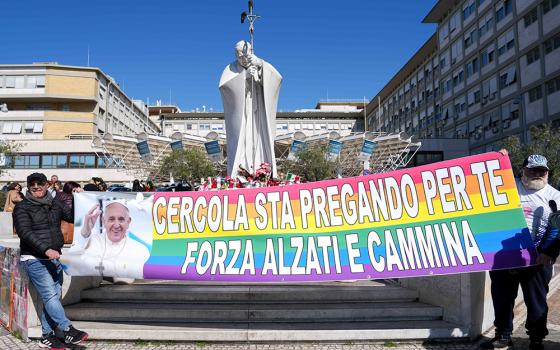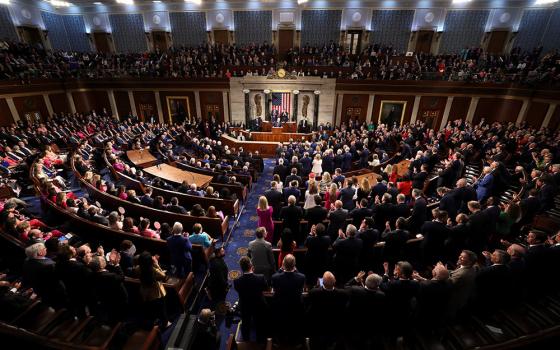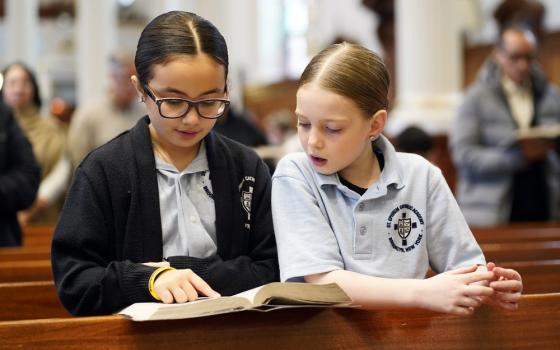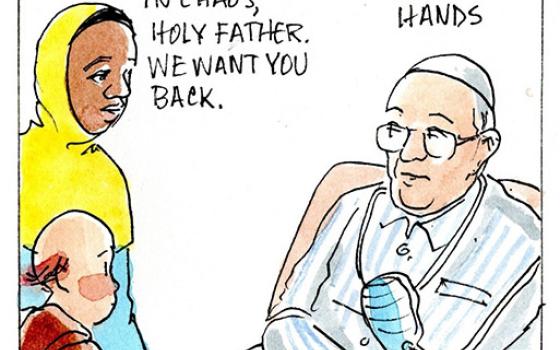
Arizona Republican Senate candidate Blake Masters, right, looks on as Democratic Sen. Mark Kelly, left, talks with Libertarian candidate Marc Victor ahead of a televised debate in Phoenix Oct. 6. Masters' campaign, NBC News first reported, has rewritten or removed at least half a dozen positions opposing abortion from his website in recent weeks. (AP/Ross D. Franklin)
Worried about a backlash from voters after the Supreme Court's overturning of Roe v. Wade, Republican politicians this midterm season are moderating their opposition to abortion. In some cases, they are walking back support for fetal personhood amendments and overhauling websites to edit or erase sections touting their pro-life credentials.
Some Catholics and others involved in the anti-abortion movement say they are skeptical and angry about the apparent softening on the issue ahead of the Nov. 8 midterm elections.
"Sadly, some Republican candidates across the country are ignoring the polling and common sense that show voters care about protecting the preborn and are instead taking their marching orders from bloviating campaign consultants who are telling them to run away from protecting life in [the] law," Kristan Hawkins, the president of Students for Life of America, wrote in a Sept. 13 Instagram post in which she challenged Minnesota Republican gubernatorial candidate Scott Jensen.
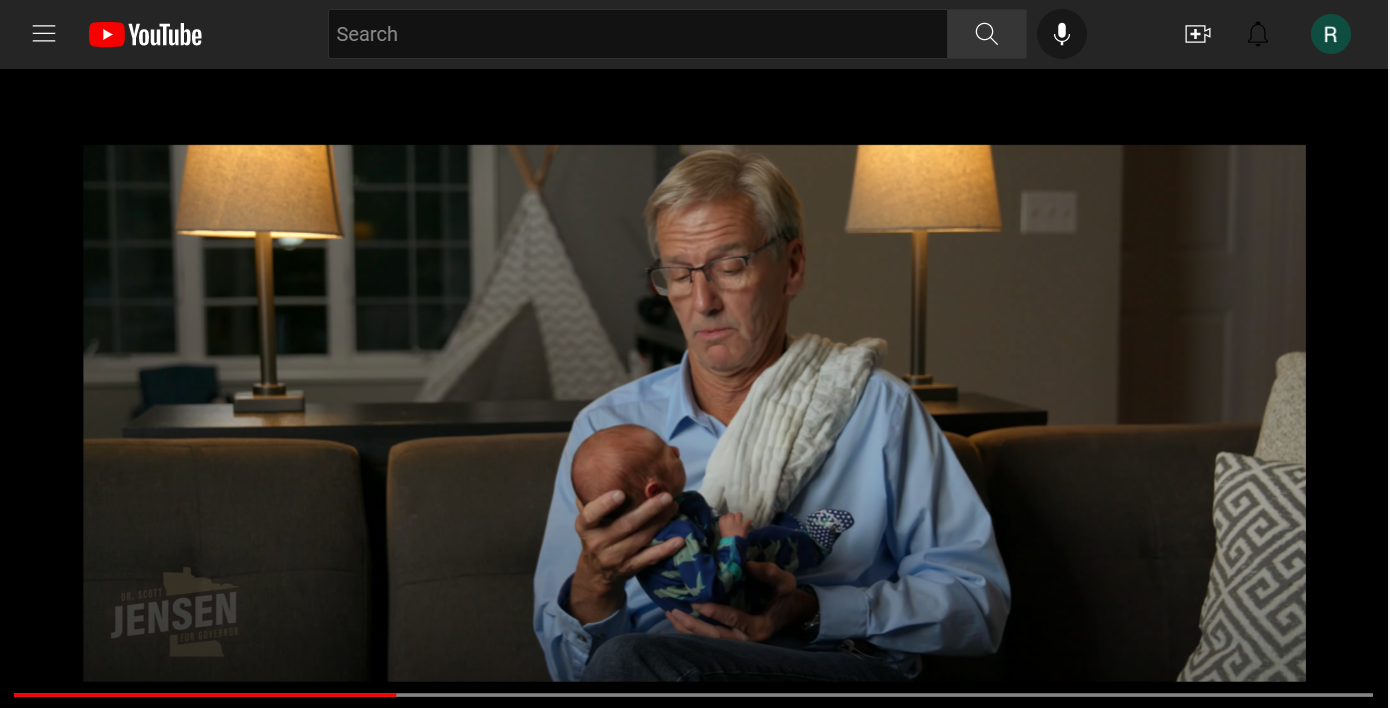
In a campaign video dated Sept. 6, Jensen, a family physician, said that he is not running to outlaw abortion, which he described as a "protected, constitutional right" in Minnesota. In May, however, Jensen told Minnesota Public Radio that he was committed to banning abortion.
Hawkins pointed to that shift in her Instagram post. "Republicans lose when they run away from their beliefs, looking like pandering politicians who bow to political pressure and slick TV ads," she wrote.
Other anti-abortion activists say they are not worried that GOP candidates are abandoning their cause. They say the candidates are being politically savvy in the post-Roe landscape while they run against a Democratic Party that they argue has become extreme in its opposition to any abortion restrictions.
"We have not been concerned about [pro-life] candidates focusing on what is going to be possible from a political perspective," Mallory Carroll, vice president of communications for the Susan B. Anthony Pro-Life America, a national anti-abortion advocacy group, told NCR.
Carroll cited Arizona Republican Senate candidate Blake Masters, who has been endorsed by the group's political action committee. Masters' campaign, NBC News first reported, has rewritten or removed at least half a dozen positions opposing abortion from his website in recent weeks. One position removed was Masters' previously stated support for a federal personhood law to protect fetal life, NBC News reported.
Carroll said Masters "still supports protections for unborn children from the earliest stages" of pregnancy.
"That is still his position, as it is our position as well," Carroll said. "We want to protect every human being from the moment of conception."
A voter marks a ballot during the primary election and abortion referendum in Kansas City, Kansas, August 2. Voters rejected a ballot referendum that would have added language to the state constitution to say there is no constitutional right to abortion in Kansas. (CNS/Reuters/Eric Cox, Reuters)
Jamie Manson, president of Catholics for Choice, a group that supports abortion rights, told NCR that she was not surprised to see Republicans softening their positions on abortion.
"They want to win, and they will do whatever they need to do to win," said Manson, who suggested that the candidates' shifting stances reflect the overall electorate's support of legalized abortion.
Keeping abortion legal "is actually a popular opinion, but we have this right-wing, well-oiled machine that wants to keep pushing a narrative that a majority of Catholics, and a majority of people in the United States, are opposed to it, and that is completely false," Manson said.
Politicians pivoting on issues is nothing new. After primary campaigns, when they need to prevail with more ideological voters, candidates often revamp their messaging to appeal to moderate, centrist voters in general elections. But political analysts say Republican candidates are now facing a potential voter backlash over the U.S. Supreme Court's June 24 decision in Dobbs v. Jackson Women's Health Organization, which overturned the high court's 1973 Roe ruling that had declared abortion to be a constitutional right.
With control of the House and Senate at stake, Republican Party operatives have reportedly told candidates across the board to soften their positions on abortion and to avoid talking about the topic as much as possible. The New York Times reported in late August that at least 10 Republican candidates in competitive races this year have updated their campaign websites to downplay their ties to former President Donald Trump, who is deeply unpopular with centrist voters, or to adjust their stances on abortion.
'They've put their fingers in the wind, and decided it's not popular for them to say any longer that every innocent preborn baby is a person.'
—Judie Brown
"It's pure politics," said Geoffrey Layman, chair of the political science department at the University of Notre Dame, who told NCR that the shifting on abortion has been "rampant" and "almost ubiquitous" among Republican candidates in recent months.
"Before Roe v. Wade was overturned, taking a more extreme position on abortion wasn't politically costless for Republicans, but the benefits outweighed the costs," Layman said. "It gave them an opportunity to appeal to pro-life voters, who are the base of the Republican Party, without scaring away pro-choice Republicans or people with more moderate positions on abortion.
"But once Dobbs hit, and all of a sudden the states can now do whatever they want in terms of abortion, we saw several states that began to enact bans, sometimes even in the cases of rape, incest and danger to the woman's life. Voters reacted negatively toward those bans."
In August, voters in Kansas, a deeply conservative and normally reliable Republican state, defeated a proposed amendment to the state constitution that would have allowed the state legislature to ban abortion there.
Anti-abortion activists suggest the ballot language confused voters, but political analysts and abortion rights activists argue the Kansas vote reflects decades of polling that show while a majority of Americans favor some restrictions, especially on abortions in the second and third trimesters, they do not support banning the procedure outright.
"A pure pro-choice position doesn't appeal any more to voters than a pure pro-life position does," Layman said. "But if those are the choices given to voters, I think the average voter takes the pure pro-choice position."
Advertisement
However, anti-abortion leaders say they believe public sentiment is on their side, especially when Republican pro-life candidates contrast their positions to the Democratic Party, which favors codifying Roe's previous protections in federal law, or further expanding abortion rights.
Judie Brown, president and co-founder of American Life League, a nonprofit national Catholic anti-abortion group, told NCR that the Republican candidates who are softening their abortion positions are "selling out babies" and trying to "have it both ways."
"I'm very familiar with the ability of politicians to walk away from subjects that are uncomfortable to them, and unfortunately in this particular case, we're dealing with politicians who really have no deep-seated commitment" to the issue, Brown said.
In her Instagram post, Hawkins predicted that Republicans' strategy to downplay abortion in this campaign season is going to cost them on Election Day, "allowing more pro-abortion extremists Democrats to win." Brown, of American Life League, described their pivoting as more of a "dumping" of the pro-life cause.
"They've put their fingers in the wind, and decided it's not popular for them to say any longer that every innocent preborn baby is a person," Brown said, "And that's a tragedy."



